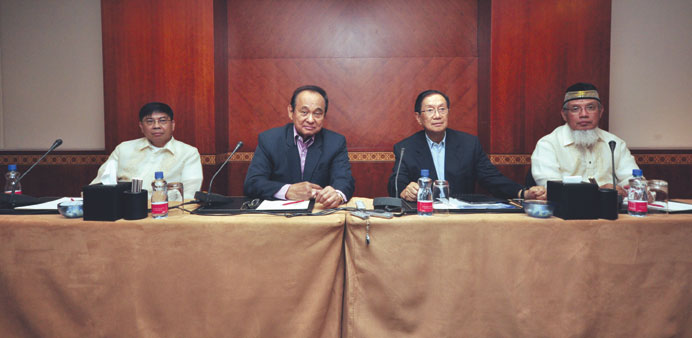Ambassador Crescente Relacion, Comelec commissioner Lucenito N Tagle, Department of Foreign Affairs undersecretary Rafael E Seguis, and Comelec commissioner Elias R Yusoph during a media briefing on Overseas Absentee Voting yesterday. PICTURE: Peter Alagos
Peter Alagos
Business Reporter
The Philippines’ Commission on Elections (Comelec) is targeting to get 1mn new Overseas Filipino Workers to register in their respective embassies in time for the May 2016 national elections, the chairman of the Overseas Voting Secretariat has said in Doha.
Undersecretary Rafael E Seguis of the Department of Foreign Affairs was in Qatar in connection with Comelec’s three-day specialised training of 56 Special Board of Election Inspectors and Canvassers, which concluded yesterday.
“We are trying to encourage OFWs to register and exercise their right of suffrage,” Seguis said.
As of 2013, Filipinos in the Mena region accounted for 28.91% of the 10.5mn OFWs worldwide, he said.
Seguis said the goal was to get at least 300,000 OFWs in the Mena region to register before the 2016 elections.
In Doha there were only 23,260 registered voters or 10% of the 200,000-strong Filipino workforce in Qatar, he said. “We are aiming to raise the figures to 90%.” Of the 3,051,431 OFWs in the Middle East, only 281,201 were registered overseas voters.
In the 2013 elections, out of the 281,201 registered overseas voters only 9.03% or 32,382 cast their votes, Seguis said.
Comelec Commissioner Lucenito N Tagle, who chairs the Committee on Overseas Absentee Voting, said the biggest concentration of Filipino voters overseas was in the Asia-Pacific region followed by the Mena region, the US and Europe.
Tagle said the low turnout of voters in the Mena region was due to problems with accessibility.
“The main complaint is that polling stations are far from their residences and that their employers do not allow them to vote during elections,” Tagle explained.
The Philippine ambassador to Qatar, Crescente Relacion, however assured that OFWs in the country would not be prevented from going to the polling stations in the May 2016 elections. “I do not think that accessibility will be a problem in Qatar,” he said. The envoy lamented that “the problem is that OFWs based in Qatar refuse to exercise their right to vote.”
Relacion said the Philippine embassy would request Qatar to allow “field voting” to encourage more OFWs to go to polling stations outside the embassy premises.
In the last registration period, the ambassador said, the embassy had conducted field registration “but maybe not in a very sustained manner.”
“So with the support promised to us for more voting registration machines, there will be no excuse for us to reach out to more OFWs in their workplaces,” Relacion said.
Asked if there were plans to conduct automated elections abroad, Tagle said Comelec is already discussing a plan to conduct online or Internet voting and registration and hopes to have it approved in Congress and the Joint Congressional Oversight Committee before the 2016 polls.

